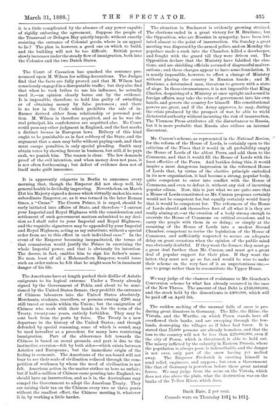The Court of Cassation has quashed the sentence pro- nounced
upon M. Wilson for selling decorations. The Judges find that the facts are fully proved, and that M. Wilson had consciously engaged in a disreputable traffic ; but they also find that when he took bribes to use his influence, he actually used it,—an opinion clearly borne out by the evidence. It is impossible, therefore, to hold him guilty of swindling or of obtaining money by false pretences ; and there is no law in the Code which prohibits the sale of in- fluence derived either from relationship or personal posi- tion. M. Wilson is therefore acquitted, and as he was the real principal, his confederates are acquitted also. No Court could pass any other judgment in England, and the fact marks a distinct lacuna in European laws. Bribery of this kind ought to be punishable as in fact robbery of the State, and the argument that a man may bribe without paying cash, and then must escape penalties, is only special pleading. Smith may obtain votes by showing favour in business, but still, if he pays cash, we punish him. The reason is clear. The law demands proof of the evil intention, and when money does not pass, it is not often forthcoming ; but defect of evidence does not of itself make guilt innocence.


































 Previous page
Previous page